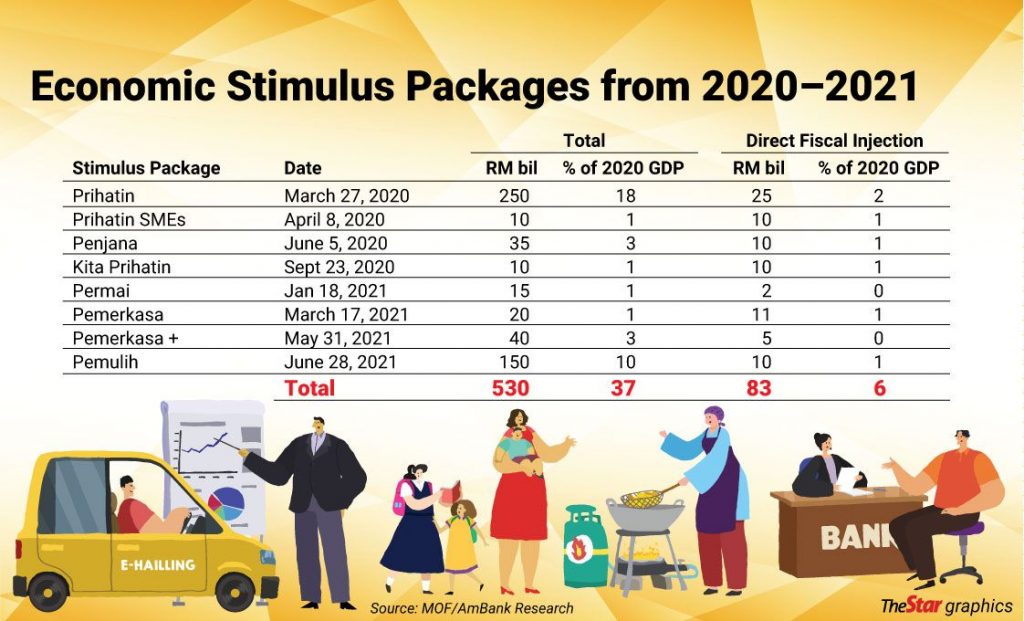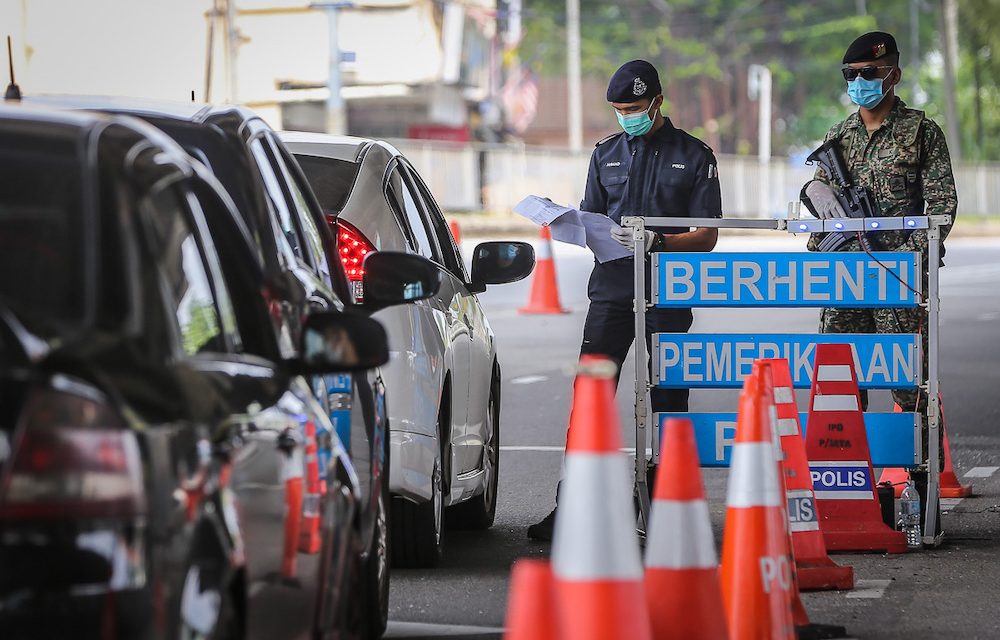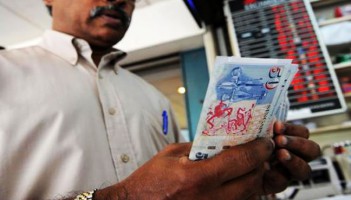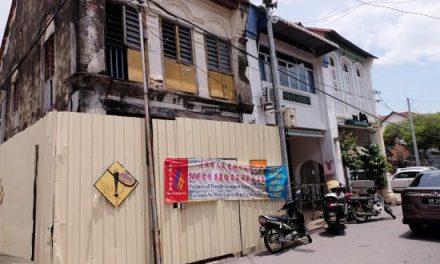Miti letter won’t be accepted at roadblocks from July 18-21, says IGP
Police will not accept documents from the Ministry of International Trade and Industry (MitiI) as a valid movement permit for the four-day period from July 18-21 for interstate travel. Inspector-General of Police Datuk Seri Acryl Sani Abdullah Sani said the ban was following the detection of an increased number of vehicles on the highways over the past two days. “This is to avoid irresponsible parties from misusing the MITI permission letter as approval to cross states to celebrate Hari Raya Aidiladha,” he said. However, he said the ban did not apply to emergency matters with police permission as well as health matters, including vaccinations. (Malay Mail)
PM: Malaysia sets new target of fully vaccinating 100% of adult population by Oct
All adults in Malaysia are expected to be fully vaccinated by October under a new immunisation target set by the government to stem the recent surge in Covid-19 cases, said Prime Minister Tan Sri Muhyiddin Yassin. He said the fast-track approach in the National Covid-19 Immunisation Programme (PICK) includes boosting the capacity for vaccination rate to 500,000 doses per day, to tackle the emergence of new variants of the virus which are more vicious. He said the government is also aiming for 100% of the adult population in Selangor and Kuala Lumpur to be given at least one dose of the vaccine by August 1 under the Operation Surge Capacity, while Sarawak is expected to hit this target by the end of August. “Almost all states will achieve a vaccination rate of more than 50% by the end of August. All states will record a vaccination rate exceeding 70% in September,” he said. Muhyiddin said the government had booked more than 76.1 million doses of vaccines, 70% of which are Pfizer and the rest comprising Sinovac, AstraZeneca and CanSino. (Malay Mail)
Govt to review implementation of construction projects nationwide
The government will review all construction projects nationwide, particularly those which have yet to kick-off, Minister in the Prime Minister’s Department Datuk Seri Mustapa Mohamed said. “The Economic Planning Unit and the Ministry of Finance will review all projects, especially those that have not started yet but already have allocations. Decisions will be made as far the direction of these projects are concerned,” he said. Elaborating further, Mustapa said this was due to many projects provided with allocations having undergone changes in terms of cost due to the increase in building material prices prior to this. Another factor is the increase in land prices taking into account that it normally covers 40% of the project’s total cost. Besides this, Mustapa said the implementation of projects has been rather slow due to the ongoing Covid-19 pandemic. (Malay Mail)
Education Ministry: Home-based teaching and learning to continue nationwide until Aug 31
The home-based teaching and learning (PdPR) school sessions will continue until Aug 31. The Education Ministry (MoE) said this decision was made after taking into account the current Covid-19 pandemic situation as well as after discussions with the Health Ministry (MoH) and the National Security Council (MKN). MoE said the decision applies to all government and government-aided schools, private schools and education institutions registered with the ministry. “Taking into account this vaccination rate, MoE has decided that schools will be opened in stages for face-to-face teaching and learning sessions from September 1, 2021. The MoE will provide more details on the face-to-face sessions at least a week before schools are re-opened. The MoE is committed to doing our best on this matter,” the statement read. He said the ministry will also take into account risk assessments done by the MoH and MKN if there is a need to change the proposed date, with any changes to be notified much earlier. (Malay Mail)
Malaysia’s Covid-19 stimulus packages on par with those in developed countries
Malaysia’s Covid-19 stimulus packages contributed 20% to the country’s GDP, comparable to other developed countries and higher than regional developing countries, a comparative analysis of government assistance reported. The Ministry of Finance analysis compared Malaysia against Asia Pacific (Indonesia, Philippines, Singapore, Thailand, Vietnam, Australia, New Zealand, China, Taiwan, South Korea) and the United Kingdom and United States of America. “In the US, stimulus packages contributed 26.5% to GDP, New Zealand 19.3%, Australia 19.1% and the UK 17.8%. As for the Asian region, Malaysia is on par with Singapore at 20% as well, while other countries such as China, Thailand, Vietnam and Taiwan contributed below 10% to their GDP,” the report found. The Unit for the Implementation and Coordination of National Agencies on the Economic Stimulus Package (Laksana) found the initiatives which Malaysia has put in place are currently not available in other countries. This includes insurance moratorium (for three months), real property gains tax (RPGT) exemption and My30 and My5 unlimited passes. Initiatives which Malaysia has put in place which are currently not available in other countries would be the Sukuk Prihatin. The Perikatan Nasional (PN) government had pledged RM380 billion in relief packages since the first movement control order (MCO) was imposed on March 18 last year. (Malay Mail)

Which vaccines have the WHO nod?
Five out of six vaccines under the National Covid-19 Immunisation Programme have been endorsed by the World Health Organisation’s (WHO) Emergency Use Listing (EUL). The EUL currently has seven Covid-19 vaccines approved for emergency use, with Pfizer-BioNTech being the first to be accepted in December 2020, followed by AstraZeneca and Covishield in February this year, Johnson & Johnson in March and Moderna in April. In May, the WHO added Sinopharm to the EUL listing – the first Chinese-made vaccine to be included – followed by Sinovac in June. “The WHO’s EUL is a prerequisite for the Covax Facility vaccine supply and international procurement. It also allows countries to expedite their own regulatory approval to import and administer Covid-19 vaccines,” the WHO said in a statement. This means that only vaccines that are included in the EUL can be included in Covax, the global programme that aims to provide Covid-19 vaccines mainly to developing nations. So far, the vaccines that have gained approval for Malaysia’s Covid-19 inoculation drive are those from Pfizer-BioNTech, AstraZeneca, Sinovac, Sinopharm, Johnson & Johnson and CanSino. (The Star)





